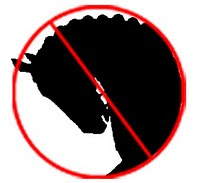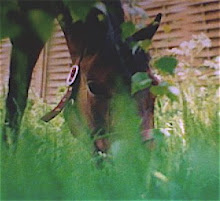The colonized changed their mind in regard to the "Bedre vilkår" ("Bedre vilkår for sindslidende": better conditions for the mentally ill - I still cringe at "mentally ill", but, well...) -initiative, and so did I. The demand for more beds at psych wards was replaced by a demand for more 24-hour-places at facilities like safe houses, which meant that I could support all 12 demands, sign the petition, and join the organization group for the demo and pre-hearing, that both took place on March 5th at Copenhagen.
Miki, the initiator of the event, asked me to do the keynote address at the pre-hearing, and to my fright I heard myself agree to it. It had been a while since I'd talked to a larger audience. Well, I survived (obviously), and here's the address:
I want to open the pre-hearing today with a short survey of the history of psychiatry, and some reflections about what I think, should be concluded from this history.
Until the mid 1700s the "mentally ill" were simply locked up whenever they became too tiresome for society. Just as offenders were. And since many "mentally ill" do have trouble to express their needs, emotions etc. clearly and understandable, they weren't considered to have any, and were, in consequence, treated worse than animals: no proper food, no heat in winter etc. Many, of course, died under these circumstances.
About the mid 1700s the medical profession became aware of, that this maybe was a group in the population, that the profession possibly could make capital out of - via the relatives, and maybe use for a further raising of the medical profession's profile - by being able to cure even "mentally ill", not only physically ill people.
All the same, the "cures" of those days were still evidently characterized by the fact, that the "mentally ill" before had been regarded a kind of offenders: still people were locked up, and punished respectively tortured, e.g. by drowning and reviving them, drenching them with ice-cold water, placing them on fast-rotating seats and tables, giving them emetics until they were no longer able to see out of their eyes with nausea, and bled on a large scale in order to weaken them, and so on.
Altogether in order to frighten them out of their wits, in the hope that the mortal dread would make them behave well again. Fundamentally the same philosophy that the penal system is based upon: Behave, or otherwise...
Also in those days, many died from the "treatment". Among others an English Quaker-woman, Hannah Mills, in 1791.
The Quakers never had any greater trust in the medical profession, the modern western in general, and Hannah Mills death under medical care was the final straw.
The Quakers decided not to expose their own to psychiatry anymore, but instead to take care of community members in crisis themselves, according to their own philosophy taken from Aeschylus: "Soft speech is to distemper'd wrath, medicinal." Their first retreat opened in England in 1796. This was the beginning of which later on came to be termed "moral treatment".
The Quakers were convinced that manageable settings, that is small sized retreats, situated in areas of natural beauty, providing good, even luxury facilities and food, and kind, respectful and understanding care were the best help for people in crisis.
Staff members who hit or just talked disrespectfully to a "patient" were immediately dismissed. Staff and "patients" both had their meals together, and were equally participating in the large variety of activities provided. While participation, of course, was 100% voluntary.
The "moral treatment" of the Quakers, that can be compared to Laing's Kingsley Hall, Loren Mosher's Soteria, and similar alternatives to psychiatry, had enormous treatment-successes - 80 - 90% recovery, the same as Soteria, the Vestlaplandsmodellen and the like - and "moral treatment" spread fast, both in Europe and the U.S.
BUT: while it in the beginning was a pure Quaker-domaine, the spread meant the single countries' governments to enter the picture.
The Quakers had chosen to do without any involvement of the medical profession at their help for people in crisis. No medical doctor was employed by them. After all, it was a medical doctor who had Hannah Mills' life on his conscience.
Different from the Quakers, the single countries' governments had no objections against medical doctors. Which the latter knew to take advantage of, since they'd been looking at the Quakers' "moral treatment" with increasing concern: it deprived them of a lucrative source of revenue.
So, medical doctors started to apply for jobs at the newly established institutions under governmental management - and got these jobs. In order to legitimate their involvement as DOCTORS, they took the Quakers' idea, that people in crisis simply went through a process that was mentally exhausting, fraying their nerves, and interpreted this metaphor literally as physically frayed nerves.
The biological model, the physically frayed nerves, legitimated medical, physical "treatment" measures to again be applied, in addition to the Quakers' purely moral, humane help: again people were exposed to various "treatment" measures similar to punishment and torture.
The recovery rates dropped proportionally to purely humane help being replaced by medical "treatment" which turned more and more people into chonic long-term "patients". Consequently, the institutions became bigger and bigger, while there was lesser and lesser governmental funding awarded to run them.
At the same time a change of attitude towards people who showed from the norm deviating behaviour took place in society, away from respecting them as equal fellow human beings, towards regarding them not only as disturbed but also extremely disturbing the rest of society elements, that ought to be put away and silenced.
At the end of the 19th century psychiatry in a way was back in a pre-Quaker-state: people were locked up under miserable circumstances at enormous institutions (asylums), and treatment consisted of threatening and terrorizing them, also because there, due to the lack of funding, was very little staff available.
No longer was staff expected to show empathy and respect as the decisive qualities, but was employed according to the criterion of how many "lunatics" they were able to control at the same time - with the help of physical violence. Along with the invention of lobotomy, today euphemistically called "psycho surgery", ECT and psychopharmacologic drugs, the medical profession furthermore got the wind in its sails: look what we can - NOT!
And, apart from single exceptions like the Vestlaplandsmodellen, Soteria, the Italian psichiatria democratica, etc., AND, here in Denmark, Gaderummet, this is where we are today.
The mental health system hasn't changed much since it was established in the 18th century. Neither in regard to treatment methods nor in regard to the philosophy these are based upon.
It's true that people in Denmark aren't anymore locked up indefinitely at huge institutions, but they are still locked up in their own small chemical institutions, in most cases for life.
The still not in any way proven assertion about "mental illnesses" being genetically determined brain diseases labels people with existential problems as second rate human beings with a defective and therefor unreliable brain functioning.
In consequence, they are talked down to, if at all they are talked TO and not just ABOUT, and they are threatened and terrorized, although today in a somewhat more sophisticated way than at the time when they were drowned and revived and the like.
Today we have restraints, "medicine" without effect apart from numerous extremely unpleasant and health damaging side effects, and we have electroshock. We have a total absence of choices, and last but not least, we still have a very high mortality rate, although this today is explained away as being a result of the "illness" rather than of the treatment.
All in all an Orwellian system, consistently denying us the right to define ourselves, the right to self-determination, and through this the right to choose. A system that deprives us of our identity and integrity, and reduces us to "patients" more or less without legal rights, a system that leaves us paralyzed and without a language in a vacuum stripped of meaning, where we can't do anything but deny ourselves. All this "for our own good"...???
That it is possible to, very effectively, help people with emotional problems without the interference of the medical profession, both the Quakers, and later Laing, Mosher and others have proven. Today Windhorse, Vestlaplandsmodellen and Gaderummet prove this. A medical evaluation is useful in order to exclude the presence of physical problems. But after this is excluded, doctors have nothing more to contribute to the solution of the problem, and ought to be left out of the help for people in emotional crisis.
Personally, I'm more than tired of psychiatry's continued allegations, that there were no documentation for other than medical approaches to work, while this is documented since the beginning of the 19th century!
Evidence there is for one thing: that non-medical approaches work far better than medical ones. Why is this fact continuously denied?
I am just as tired and disappointed to hear time and again that the psychiatric profession as well as politicians are willing to listen to the users' needs and wishes, only to, subsequently, witness everything being done to force the closing down of a user-friendly alternative like Gaderummet through, and a psychiatrist who dares to speak up against overmedication in public being dismissed.
And last but not least, I am very disappointed to see a "Fremtidens ambulante psykiatri" (Future mental health community care), that sets the scene for a much easier access to ECT, and through this a furthermore increased use of this brain damaging treatment, and that does not mention ECT- and drug-free treatment alternatives with a single word.
This obviously is, in how far it is intended to listen to us, that neither in future our wishes will be taken into consideration the least.
Just like everybody else, we have a right to be seen and listened to, we have a right to ourselves and our experiences be respected, not as "patients" with an "illness", but as human beings with deeply human experiences, and we have a right to get help to understand these.
To label us being "sick in our heads" is NOT to see, hear and respect us. To see, hear and respect us, is to offer us free choice and to establish and keep up alternatives like Gaderummet.
When will society overcome its existential fear of people in extreme states of mind, when will our experiences and realities be respected as meaningful and deeply human, when will we be given the help, that can make us constructively contributing members of this society, instead of disabling us and condemning us to a life at club houses, on disability, more or less dependent on the condemning?
I myself am psychosis-experienced, and have been in the incredibly lucky situation to be able to choose a kind of "moral treatment", namely talk therapy, as my help. Among other reasons because I could afford it.
I have at no time been exposed to neither medical or other psychiatric assaults against myself, and I will always be grateful to my therapist for sparing me these, and respecting me as the human being I am.
I wished, everybody in emotional distress, regardless of the kind of distress and the person's financial circumstances, was given the same possibility to choose that I had, and thereby the possibility to choose liberation instead of oppression of their often huge constructive and creative potential.
Literature:
Robert Whitaker, Mad In America. Bad Science, Bad Medicine, And The Enduring Mistreatment Of The Mentally Ill.
Joanna Moncrieff, Psychiatric Imperialism: The Medicalisation Of Modern Living.
healing is living ritual
1 week ago







